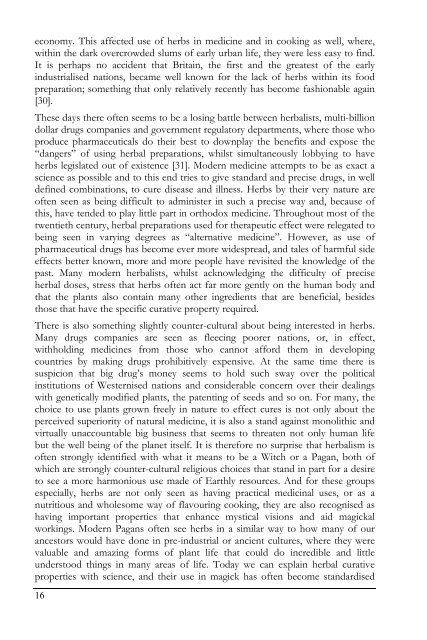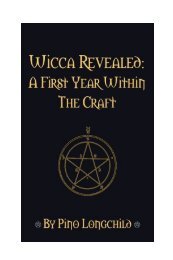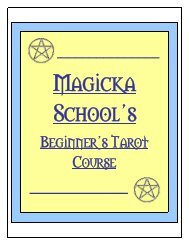A Magickal Herball Compleat.pdf - Magicka School
A Magickal Herball Compleat.pdf - Magicka School
A Magickal Herball Compleat.pdf - Magicka School
Create successful ePaper yourself
Turn your PDF publications into a flip-book with our unique Google optimized e-Paper software.
economy. This affected use of herbs in medicine and in cooking as well, where,<br />
within the dark overcrowded slums of early urban life, they were less easy to find.<br />
It is perhaps no accident that Britain, the first and the greatest of the early<br />
industrialised nations, became well known for the lack of herbs within its food<br />
preparation; something that only relatively recently has become fashionable again<br />
[30].<br />
These days there often seems to be a losing battle between herbalists, multi-billion<br />
dollar drugs companies and government regulatory departments, where those who<br />
produce pharmaceuticals do their best to downplay the benefits and expose the<br />
“dangers” of using herbal preparations, whilst simultaneously lobbying to have<br />
herbs legislated out of existence [31]. Modern medicine attempts to be as exact a<br />
science as possible and to this end tries to give standard and precise drugs, in well<br />
defined combinations, to cure disease and illness. Herbs by their very nature are<br />
often seen as being difficult to administer in such a precise way and, because of<br />
this, have tended to play little part in orthodox medicine. Throughout most of the<br />
twentieth century, herbal preparations used for therapeutic effect were relegated to<br />
being seen in varying degrees as “alternative medicine”. However, as use of<br />
pharmaceutical drugs has become ever more widespread, and tales of harmful side<br />
effects better known, more and more people have revisited the knowledge of the<br />
past. Many modern herbalists, whilst acknowledging the difficulty of precise<br />
herbal doses, stress that herbs often act far more gently on the human body and<br />
that the plants also contain many other ingredients that are beneficial, besides<br />
those that have the specific curative property required.<br />
There is also something slightly counter-cultural about being interested in herbs.<br />
Many drugs companies are seen as fleecing poorer nations, or, in effect,<br />
withholding medicines from those who cannot afford them in developing<br />
countries by making drugs prohibitively expensive. At the same time there is<br />
suspicion that big drug’s money seems to hold such sway over the political<br />
institutions of Westernised nations and considerable concern over their dealings<br />
with genetically modified plants, the patenting of seeds and so on. For many, the<br />
choice to use plants grown freely in nature to effect cures is not only about the<br />
perceived superiority of natural medicine, it is also a stand against monolithic and<br />
virtually unaccountable big business that seems to threaten not only human life<br />
but the well being of the planet itself. It is therefore no surprise that herbalism is<br />
often strongly identified with what it means to be a Witch or a Pagan, both of<br />
which are strongly counter-cultural religious choices that stand in part for a desire<br />
to see a more harmonious use made of Earthly resources. And for these groups<br />
especially, herbs are not only seen as having practical medicinal uses, or as a<br />
nutritious and wholesome way of flavouring cooking, they are also recognised as<br />
having important properties that enhance mystical visions and aid magickal<br />
workings. Modern Pagans often see herbs in a similar way to how many of our<br />
ancestors would have done in pre-industrial or ancient cultures, where they were<br />
valuable and amazing forms of plant life that could do incredible and little<br />
understood things in many areas of life. Today we can explain herbal curative<br />
properties with science, and their use in magick has often become standardised<br />
16




